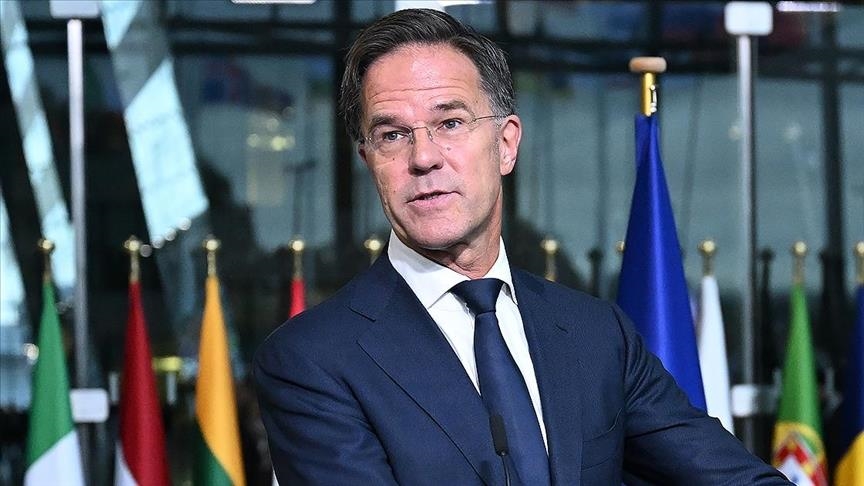LONDON
The new chief of NATO said Tuesday that on counterterrorism he and Turkish President Recep Tayyip Erdogan “see eye to eye,” adding that “fighting terrorism is something we also have to take up within the NATO context.”
Speaking at his first press conference as NATO secretary general, Mark Rutte reiterated his top three priorities in his new post: the capability to protect against any threat, support for Ukraine in fighting back the Russian war, and addressing the growing global challenges to Euro-Atlantic security.
“There’s nothing we can’t achieve together,” said Rutte, who officially took office today in Brussels, succeeding Jens Stoltenberg.
Asked about Türkiye’s expectations on the fight against terrorism and the lifting of embargoes between NATO allies, Rutte replied: “This is a very important issue.”
Saying he had discussed these issues multiple times with Turkish President Recep Tayyip Erdogan, Rutte added that the two worked together during his 14 years as Dutch prime minister, during Erdogan’s tenure as Turkish premier and then president starting in 2014.
“I think I could say (that) we are close friends, and we see eye to eye on this, and clearly fighting terrorism is something we also have to take up within the NATO context,” he said.
“He is not only pushing for that. I’m absolutely receptive to this, because we have to work on this in conjunction,” said Rutte.
“We will do that. We will have those discussions,” he said.
Türkiye, a member of NATO for 72 years, has urged fellow alliance members to take a more principled stance against terrorist groups, citing in particular some NATO members’ support for the terrorist YPG/PKK, a terrorist group that threatens Türkiye’s borders.
“Unfortunately, we have not received the expected level of support and solidarity from our allies thus far. We cannot tolerate this situation, nor is it consistent with the spirit of alliance, for the ringleaders of terrorist organizations that pose a threat to Türkiye’s national security to be accepted as legitimate actors,” Erdogan said in a July magazine interview.
Apparently addressing Türkiye’s push to end embargoes between NATO allies, Rutte also said: “I think it is important that within NATO there are no, let’s say, boundaries in terms of who you can supply whatever. I know there’s also sensitivity there, and we have to work also on that.”
This June, Turkish Foreign Minister Hakan Fidan decried such restrictions between NATO allies, a long-standing issue for Ankara, saying: “Sanctions and restrictions not only affect the allied country subject to them but also undermine NATO’s deterrent capability and defense capacity.”
– Support for Ukraine
Stressing the importance of continued support for Ukraine, Rutte said it is “the right thing to do” and also an “investment in our own security.”
“Because an independent and democratic Ukraine is vital for peace and stability in Europe, and the cost of supporting Ukraine is far, far lower than the cost we would face if we allow (Russian President Vladimir) Putin to get his way,” he warned.
He also said China has become a “decisive enabler” of Russia’s war in Ukraine through its support to Russia’s military industry.
“China cannot continue to fuel the largest conflict in Europe since World War II without this impacting its interests and reputation,” he said.
Russia is also getting support from North Korea and Iran that allows it to sustain its war, added Rutte.
Asked about allies putting restrictions on Ukraine’s use of weapons they gave it to target Russian territory, Rutter said Kyiv is fighting a “war of self-defense, and that means that Ukraine has the right to defend itself,” according to international law.
“This right does not end at the border. So that means that supporting Ukraine’s right to self-defense means that it is also possible for them to strike legitimate targets on the aggressors territory,” he said, adding however that it is up to each ally to determine its support for Ukraine.
Rutte also underlined that he is “absolutely optimistic” that both European and US support to Ukraine will continue.
“Ukraine likely would not exist as a country today without US support,” he added.
On the situation on the ground, he said it is “clearly not easy,” adding that while Ukraine’s army is holding onto parts of Russia’s border Kursk region, at the same time Russian forces are making some gains in eastern Ukraine.
“The more we help Ukraine at the moment, the sooner this will end,” he added, saying that Putin “has to realize that we will not give in, that we want Ukraine to prevail.”
It is up to Ukraine’s government to decide when they are at a stage that they want to discuss peace, he said.
On Russia’s recent statements on the use of nuclear weapons, Rutte called such rhetoric “reckless and irresponsible” but at the same time, he added: “Let me make absolutely clear, we do not see any imminent threat of nuclear weapons being used.”

